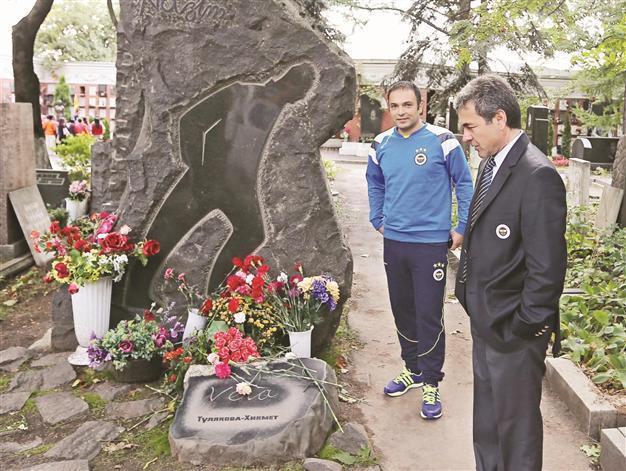Fenerbahçe returns from Russia with hope
MOSCOW

Aykut Kocaman (R) stands by the grave of great Turkish poet Nazım Hikmet Ran.
Fenerbahçe was beaten but scored a valuable away goal at Spartak Moscow in the first leg of the Champions League playoffs on Aug. 21.The Yellow Canaries lost 2-1 to the Russian side in their bid to return to the top-level club competition in European football after a three-year absence.
Emmanuel Emenike, a former Fenerbahçe player, opened the scoring for Spartak, only for Dirk Kuyt to equalize. But winger Dmitri Kombarov fired a scorcher to get the win for the home team, but Fener still has hope for next week’s return game thanks to their vital away tally.
A particular highlight of the game happened off the pitch, however, when Nigerian forward Emenike kissed the hand of Fenerbahçe coach Aykut Kocaman as a gesture of respect when he was substituted.
Emenike, a figure at the center of a match-fixing case, spent an ill-fated six-week period at Fenerbahçe last summer without having kicked a ball in a competitive match.
An Istanbul prosecutor alleged as part of Turkey’s wide-ranging match-fixing case that Fenerbahçe officials fixed their 2010-2011 Super League game against Karabükspor in return for the transfer of Emenike. The Nigerian was among the dozens of players and officials that were detained as part of the case. The Nigerian was released following a few days in custody, after which he requested a transfer and left Turkey for Russia.
Several Fener officials, including Chairman Aziz Yıldırım, were found guilty of rigging when the judge gave his verdict in May. However, Emenike’s case was separated from the case because he was abroad and did not attend the hearings.
Emenike has announced that he will be in Istanbul next week to play against Fenerbahçe.
Another sign of respect happened hours before the kick-off.
Fenerbahçe coach Kocaman visited the grave of great Turkish poet Nazım Hikmet Ran in Moscow.
Hikmet, who fled into a self-imposed exile in Moscow after being persecuted for his communist views, died in 1963.
















